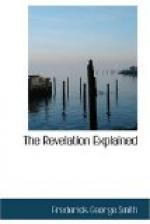“It is needful to inquire what the term Babylon means. It occurs several times in the New Testament. Here (in the Apocalypse) it is spoken of as ‘that great city,’ and her fall is doomed ’because she hath made all nations drunk with the wine of her fornication.’ In Rev. 17:5, a scarlet harlot is seen sitting upon the seven-headed and ten-horned monster, and upon her forehead is written, ‘Mystery, Babylon the Great.’ With this woman the kings of the earth are said to have committed fornication. In chapter 18 the fall of the great city, Babylon is detailed at length, and it is again said that all the kings of the earth have committed fornication with her. The harlot with Babylon stamped on her brow, and the great city of fornication styled Babylon, in chapters 14 and 18, are one and the same existence.
“There is an ancient city of Babylon often mentioned in the Old Testament, but ages before John wrote, it had ceased to be inhabited, the only dwellers among its lonely ruins were howling beasts and hissing serpents. It has never been rebuilt to this day and has passed away forever. John refers therefore not to old Babylon, but to some power yet unseen (when he was upon the earth), that should be revealed in due time, and of which old Babylon was a symbol. Let us notice some of the features of ancient Babylon.
“1. On that site took place the confusion of tongues which divided those who before had been of one speech and one family, into various tribes and schisms at variance with each other and of various tongues. The word Babylon, a memorial of this event, means confusion, and is derived from Babel.
“2. Old Babylon persecuted the people of God and destroyed the temple in Jerusalem.
“3. It carried the people of God into captivity.
“4. It was a mighty, resistless universal empire. The antitype, the spiritual Babylon, must correspond. There is a power that exhibits all these characteristics. By apostasy from the truth it originated the schism which has divided the family of God into different sects and parties which speak a different spiritual language. It has carried the church into a long captivity by binding upon it the thralldom of superstition. It has been a constant persecutor of the saints, and has enjoyed an almost universal dominion. That power is the woman that sits upon the seven-headed beast ... the false woman, symbolical of a false church, the great apostate spiritual dominion of Rome. And we may add, out of which have come—directly or indirectly—all the religious sects of the present day.”
Dr. Barnes says: “The word Babylon became the emblem of all that was haughty and oppressive, and especially of all that persecuted the church of God. The word here (Rev. 18:4) must be used to denote some power that resembled the ancient and literal Babylon in these characteristics. The literal Babylon was no more; but the name might be used properly to denote a similar power.”




